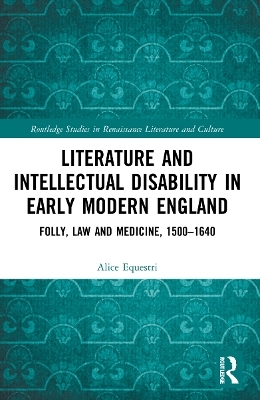
Literature and Intellectual Disability in Early Modern England
Routledge (Verlag)
978-1-032-05466-7 (ISBN)
Fools and clowns were widely popular characters employed in early modern drama, prose texts and poems mainly as laughter makers, or also as ludicrous metaphorical embodiments of human failures. Literature and Intellectual Disability in Early Modern England: Folly, Law and Medicine, 1500–1640 pays full attention to the intellectual difference of fools, rather than just their performativity: what does their total, partial, or even pretended ‘irrationality’ entail in terms of non-standard psychology or behaviour, and others’ perception of them? Is it possible to offer a close contextualised examination of the meaning of folly in literature as a disability? And how did real people having intellectual disabilities in the Renaissance period influence the representation and subjectivity of literary fools?
Alice Equestri answers these and other questions by investigating the wide range of significant connections between the characters and Renaissance legal and medical knowledge as presented in legal records, dictionaries, handbooks, and texts of medicine, natural philosophy, and physiognomy. Furthermore, by bringing early modern folly in closer dialogue with the burgeoning fields of disability studies and disability theory, this study considers multiple sides of the argument in the historical disability experience: intellectual disability as a variation in the person and as a difference which both society and the individual construct or respond to. Early modern literary fools’ characterisation then emerges as stemming from either a realistic or also from a symbolical or rhetorical representation of intellectual disability.
Alice Equestri is a researcher and lecturer in early modern English literature at the University of Padua. Between 2017 and 2019, she was a Marie Sklodowska-Curie researcher at the University of Sussex. She is the author of 'Armine… Thou Art a Foole and Knave': The Fools of Shakespeare’s Romances (2016) and has published on folly in early modern culture, on Shakespeare’s last plays, and on Renaissance translation.
Introduction: Fools, from Popular Culture to Disability Studies
Section 1: Law
2. The Legal Discourse of ‘Idiocy’ on the Stage and Page
3. ‘A fool and his money are soon parted’: the Fool and Property
4. ‘An you knew my properties somebody would ha’ me’: the Fool as a Ward
Section 2: Medicine and Physiognomy
5. Nature, Wits and Skulls: the Fool’s Head
6. Intellectual, Sensory and Physical Disability: the Fool’s Body and Face
7. Rationalising Fools’ Disability: Causes and Risk Factors
8. Epilogue: Intellectual Disability, Embodiment and Humour in Early Modern Literature
| Erscheinungsdatum | 11.08.2022 |
|---|---|
| Reihe/Serie | Routledge Studies in Renaissance Literature and Culture |
| Zusatzinfo | 2 Halftones, black and white; 2 Illustrations, black and white |
| Verlagsort | London |
| Sprache | englisch |
| Maße | 152 x 229 mm |
| Gewicht | 400 g |
| Themenwelt | Literatur ► Lyrik / Dramatik ► Dramatik / Theater |
| Geschichte ► Allgemeine Geschichte ► Neuzeit (bis 1918) | |
| Geisteswissenschaften ► Geschichte ► Regional- / Ländergeschichte | |
| Geisteswissenschaften ► Sprach- / Literaturwissenschaft ► Anglistik / Amerikanistik | |
| Geisteswissenschaften ► Sprach- / Literaturwissenschaft ► Literaturwissenschaft | |
| Sozialwissenschaften ► Soziologie | |
| ISBN-10 | 1-032-05466-2 / 1032054662 |
| ISBN-13 | 978-1-032-05466-7 / 9781032054667 |
| Zustand | Neuware |
| Informationen gemäß Produktsicherheitsverordnung (GPSR) | |
| Haben Sie eine Frage zum Produkt? |
aus dem Bereich


